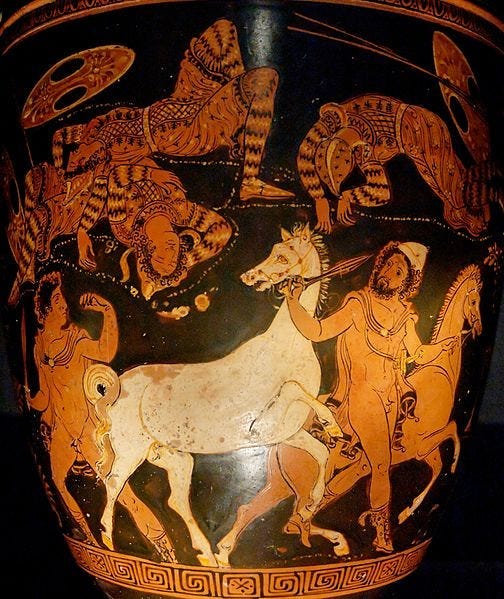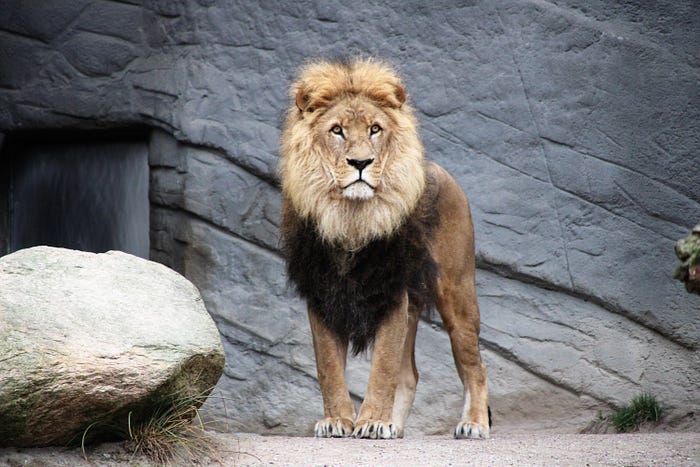A Prince Must Know How To Manage Both Men And Beasts
Advice from the Ancient Greeks and Machiavelli on being more rounded in a world of specialization
Machiavelli advised having a grip on the intellectual and ugly physical world - Created by author in Starryai
“There are two ways to fight; with laws, and with force. The first is rightly the man’s way; the second is the way of beasts. Often the first way is not enough and it is necessary to resort to the second. A Prince has to know how to manage beasts and men.”
— Niccolò Machiavelli, The Prince
The most over-used word of our age might be “niche.” We’re told this is where the riches reside, and we must find the one which most appeals to us. But it wasn’t always this way. A rounded nature and character were prized by many ancient cultures.
I think this is why we’re so unhealthy in the present day. We’re overly focused on the niche of technology, while neglecting our bodies. Previous generations lifted and moved things at work, activating muscles in the process.
We sit on chairs. The only muscles we activate are eyes and fingers while using computers. We’ve lost touch with our bodies, the greater world our muscles can manipulate, and the stresses that duo imposes which make us stronger.
Our entire world pushes us to work smarter, not harder. But one can be smart while sweating and struggling, it’s not mutually exclusive. The sweat equity can also teach you something deeper that education and technology can’t.
In Victor Davis’ translation of Musashi’s A Book of Five Rings, he notes the elite business professionals in Japan have a saying, “Bunbu Itchi,” or “pen and sword in accord.” In other words, the pen isn’t mightier. It’s equal.
These executives remove their suits in exchange for suits of armor, battling in dojos with wooden swords. The art is called kendo. But the idea and its modern practice is much greater and further reaching.
Machiavelli thought something similar, using the images of a lion and fox.
The Benefits Of Being Both Man And Beast
In The Prince, Machiavelli notes that ancient princes (like Achilles) fed Chiron the Centaur. Not literally of course, it was a figurative representation. He saw the centaur as “an example of nature, half human and half beast — one without the other was not viable.”
The ultimate prince mastered both.
Machiavelli goes on to note one must know both the nature of a lion and fox. Both have strengths and weaknesses. The lion can crush wolves, but can’t avoid traps, while the fox is the exact opposite.
The lion captivates many. And why not? It’s strength, power, and mane make it a favorite on every nature documentary. But it’s easily derailed by a snare. So, a fox’s cleverness is required to exist for anytime in nature.
In his unique way, Machiavelli is describing the limits of a niche. Although he aims his words at a ruler, we are the prince or princess of our own lives. So, the dual nature of fox and lion applies to us as well.
While our niche directs us to the world of men, there’s an equal place for the beast. However, this idea goes beyond Machiavelli. The ancient Greeks taught something similar, with their own accent.
A Mix Of Creative Imagination And Brute Force

“The Iliad and the Odyssey are a pair of true-crime classics; nothing gets done in either one until someone gets sneaky. And that someone is usually Odysseus, whose rogue’s eye made him the greatest of the Greek heroes.”
— Natural Born Heroes, Christopher McDougal
Odysseus was a thief. A statement like this might make you frown. After all, if someone called you a thief, you’d get insulted, and might even turn into Machiavelli’s lion. Although it wasn’t this way for the ancient Greeks.
Christopher McDougal in his book above points out the Greeks saw theft as cleverness. In fact, it was closer in their minds to a magic trick. You suddenly make something appear which wasn’t there before. Presto!
They even had a god devoted to stealing and lying: Hermes. Their mythology is full of wonderful ruses and thefts as well.
Jason stole the Golden Fleece
Prometheus stole fire for the benefit of us measly humans
Odysseus stole a set of armor and war horses from a rival king and even his grandfather Autolycus was known as a “Thief Lord”
For the Greeks, wealth was perishable, and anyone could take it from you (like a clever thief). So, you wouldn’t be remembered for your money. You’d be remembered for your mêtis, or “creative imagination — Machiavelli’s fox.
However, the Greeks also had biē, or as McDougal puts it “brute force.” While our Italian friend would equate it with the lion.
The ultimate Greek hero Hercules had a good mix of both. While his name may bring to mind a muscle-bound brute strangling a beast with his bare hands, it wasn’t his only talent.
In his Twelve Labors, he was purposefully challenged with trials which required more than brute strength.
He had to think his way around the undefeatable Hydra — which grew back its heads — even asking his nephew for help.
For the Stables of Augeas, he diverted rivers to flush out the cow pie infested pens in one day.
To retrieve Zeus’ Golden Apples, Hercules needed to trick the titan, Atlas. So, mêtis, not biē was required.
Although brute force was never far out of Hercules’ grasp when necessary, and the hero mastered both men and beasts once the labors were complete. You might say he blew apart the niche he was originally stuck in.
That brings us back to our world of today.
Managing Men And Beasts — Escaping Niches
“We are all capable of harm. If we weren’t, how could we possibly claim to be moral? You get no credit for not doing what you’re incapable of. A gazelle has no moral superiority over the lion that hunts it, nor the hummingbird over the hawk…If we want to be good, we must also be dangerous.”
In the twenty years or so I’ve been involved with martial arts telltale signs of a developing student become apparent. A confidence appears. They stand different, straighter, and have a more resolved nature.
Little bumps and bruises that made the newbie want to quit don’t affect them. They’re also not afraid to explain something to the class. It’s become apparent they have a power — a power which wasn’t known to them previously.
They may look like lambs to their familiar circle, but a lion has been created inside. It just sits and waits. Well, until it’s called for, then all hell breaks loose.

I can’t help but see our niche society as suffocating this lion. We worship technology. We devote everything to building our brains but neglect the body that carries it.
Our pen isn’t mightier than our sword, it should be equal. Working smart is wonderful, but the stress developed from hard physical labor can’t be won through a book or screen.
Machiavelli might point out we’ve forgotten to feed the centaur. We’re all fox, no lion. Mêtis is prized while we kick biē to the curb.
Odysseus thought up the Trojan Horse, but also picked up a spear to deal with the suiters harassing his wife. Hercules used brains to get through most of his trials but would never have made it through the first without brute force.
The well-rounded nature of our ancestors involved the mind and body. Not a niche of one or the other. Fitness isn’t just something you do to look good in jeans. According to former Navy SEAL David Goggins, it “calluses our mind”.
The beastly physical struggle develops an armor that coats our brain and soul. Without it, we’re a centaur without legs — incomplete.
While most of our daily work may not look like the “labor” of our grandfathers and grandmothers, it’s critical we find something similar and incorporate it in our lives.
Technology has made hammers, axes, and wheelbarrows obsolete for most, but there are still weights to be lifted, dojos waiting for students, and marathons to be run. Chiron is starving and waiting for dinner.
A true prince must know how to manage both men and beasts.
-Originally posted on Medium 8/9/22



